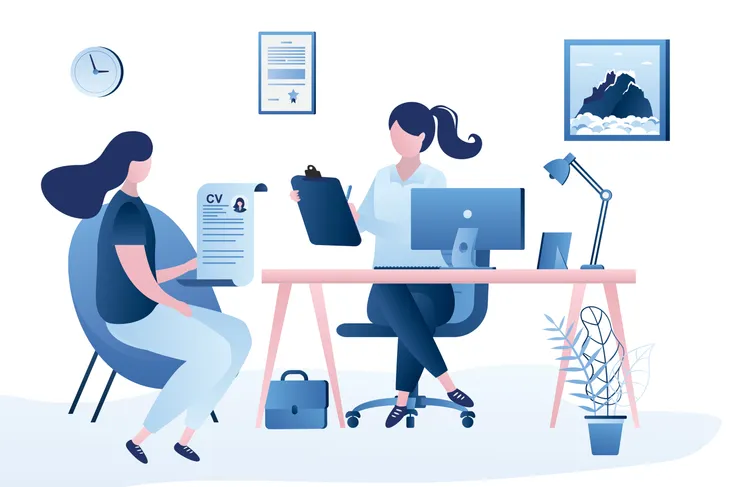According to Seed Scientific, only about 30% to 40% of job-seekers who reach the interview stage end up receiving a job offer. Unfortunately, those raw numbers suggest that you have a 60% to 70% chance of not getting hired after your interview. However, it’s possible to slightly rig the game in your favor. Proper preparation is a major key to success. To ready yourself for a job interview, anticipate questions you will likely be asked and come up with answers in advance. This will help you appear more poised and engaged. You will thus stand a better chance of impressing the person asking the questions.
Popular job interview questions include both predictable and under-the-radar queries. This guide covers a dozen examples from both categories that you should be ready to answer. Human resource experts also stress the importance of questioning yourself about the opportunity at hand. To this end, the guide concludes with a run-down of important self-assessment considerations you should make before interviewing for a job.
Common Job Interview Questions (and Strategies for Answering Them)
12. “Tell us about yourself.”
This predictable question is the icebreaker most often used to start the session. Interviewers often ask it in a casual, almost offhand way. This is purposeful, as the question is often meant to transition into the deeper, more meaningful queries that will follow.
When asked this question, you should offer the interviewer a new insight into your skills, traits, and/or background. They have already read your resume, so you will want to avoid simply repeating its contents. You should avoid getting too personal here, so try to skip talking about your spouse, children, age, or anything else relating to non-business activities. Instead, pick something safe if you want to add a personal touch. “I’m learning to surf” or “I recently adopted a dog” are great examples.
11. “What do you know about our company/organization?”
Interviewers ask this question to gauge your level of engagement with the company. You don’t need to know everything there is to know about the employer. Instead, the interviewer is looking for evidence of your enthusiasm.
At a minimum, you should know the following details about your potential new employer.
- The specific sector of the industry in which the organization operates.
- Its values and general details about its organizational culture.
- Major competitors and strategic challenges facing the organization.
- The organization or company’s goals and mission.
Pro tip: if you only offer vague details pulled off the company’s website, you’ll be all but dead in the water. Demonstrate meaningful knowledge of the organization and the industry and you’ll stand a much better chance.
10. “Why do you want to work here?”
You may have applied for a hundred jobs leading up to this interview. Even so, your goal in answering this question should be to make it seem as though this is the single most important employment opportunity you currently have.
A good answer to this question will draw on the research you did in preparing your response to the previous question. (“What do you know about our company/organization?”) When possible, pluck insights from external sources. This shows you have gone well beyond the basics in preparing for this all-important interview.
9. “What are your biggest strengths and weaknesses as an employee?”
When asked about your strengths, there’s a simple but powerful hack you can use to nail the answer. Review the job posting for the position and go over the “core competencies” section (or its equivalent). Evaluate the skills the employer considers essential. Then, use your answer to explain how your own education or experience matches them.
With weaknesses, you want to avoid anything that might problematize your ability to get the job done. Instead, try to formulate an honest and insightful answer that isn’t detrimental. Always include an explanation of how you are working to overcome the weakness you’ve identified. Human resource experts often cite this as one of the most important questions to prepare a compelling answer to, so spend some time on it.
8. “Explain a situation in which you solved a workflow inefficiency or problem.”
This question tests you in two ways. First, it gives the interviewer insight into your creativity and problem-solving proficiencies. Second, it also tests to see how well you think off the top of your head. In forming your answer, come up with something that made a significant and positive impact on your workplace.
Alternately, the interviewer might ask you to describe an accomplishment you’re proud of. If you get this version of the question, go beyond your resume. Highlight something that demonstrates your uniqueness, personal values, and resilience.
7. “Why should we hire you?”
As with many of the questions on this list, the interviewer is looking for unique insights into you with this query. Again, it’s important to avoid being generic. Offer something specific to yourself — something the employer will only get if they hire you. Not someone else. You.
In preparing for this question, come up with a list of what human resource professionals call your “unique selling points.” What rare, valuable qualities separate you from the rest of the candidate pool? This is your opportunity to explain them.
6. “Why did you leave your last job?”
This is often used as a bit of a trick question. The interviewer may be interested in knowing what brought you to the job market. However, they also have an ulterior motive. They’re looking for clues into how you would fit into their workplace culture.
One thing they’ll be watching for carefully is evidence of toxicity. If you spew off a convoluted story about coworker drama or bad-mouth your last employer, it will trip a red flag. Even if your last job was a nightmare, find a positive way to spin it. At the very least, show that you maintained a positive mindset even in the face of an adverse experience.
5. “Where do you see yourself in 5-10 years?”
This question is designed to test your ambition and see how goal-oriented you are. It is usually asked in interviews for positions with meaningful advancement potential.
In your response, be realistic. It will also help if you can work in references to trends or developments within the company’s industry. Explain how those trends could impact your career plans. This demonstrates insight and awareness, which employers value.
4. “What are the most important things you are looking for in your next job?”
Insiders usually recommend offering a skills-focused answer to this question. Zero in on a particularly well-developed skill you possess that aligns with the position’s duties. Then, talk about how you would like an opportunity to use and further develop that skill.
Beyond this, you should also try to touch on your motivations for applying to this particular position. Make your answer relevant to the job at hand and reflective of your long-term career goals.
3. “What would your last supervisor or boss say about your work habits?”
You can use this question as an opportunity to boast about your skills and accomplishments without being direct. Your answer will put the praise in someone else’s mouth, which of course makes it totally okay.
Emphasize positives when answering this question. You already have been (or probably will be) asked about your weaknesses. That should be the one and only time you discuss your negative traits during the interview.
2. “If you could be an animal, which animal would you be and why?”
In asking this strange question (or one like it), your interviewer has a specific objective. They aren’t looking for a particular answer as much as they’re testing you to see how fast and well you think on your feet.
From this perspective, the answer you give is of secondary importance. Likening yourself to a powerful eagle, cunning fox, or lordly lion matters to the interviewer less than the poise and confidence with which you respond.
1. “Do you have any questions for us?”
You may have heard that you should always have at least a couple of questions ready for the interviewer. It’s true. Doing so shows that you are prepared, engaged, and excited about the opportunity.
In some cases, the questions you prepared will be answered spontaneously as the interview progresses. Avoid repeating them if this occurs. Instead, prepare a longer list of potential questions and draw on your backups. The “Questions to Ask Yourself” section below doubles as a source of inspiration for queries you can ask the interviewer when given the opportunity.
Questions to Ask Yourself
During a job interview, you are also screening the employer for a potential match just as much as they are screening you. With this in mind, there are several critical questions you should ask yourself leading up to, during, and after the interview. These include:
- If I get this job, how am I likely to feel each weekday morning when it’s time to wake up and go to work?
- Is this job more of a short-term fix or a path to a long-term career?
- Do I believe in the company and its mission?
- Is this a job I can be proud of?
- What will my commute be like, and can I live with it day in and day out?
One new question that has cropped up in the past 18 months that we also recommend asking is this one: “How did your company respond to the Covid-19 pandemic?” This will let you evaluate whether how much they value their employee’s health and overall well-being. Look for things like allowing work from home, paid sick leave, or increased insurance benefits to cover testing. A lot of companies like to proclaim “we’re a family!” Ask this question to find out which ones actually acted like it when it mattered the most.
Evaluating these aspects of the employment opportunity will help you be ready to respond to a job offer, should you receive one. Doing so will also inform your approach to salary negotiations. Figuring out the money will mark the next critical step in your employment journey, should things reach that stage. Good luck, and don’t worry — you’ll ace it.
















